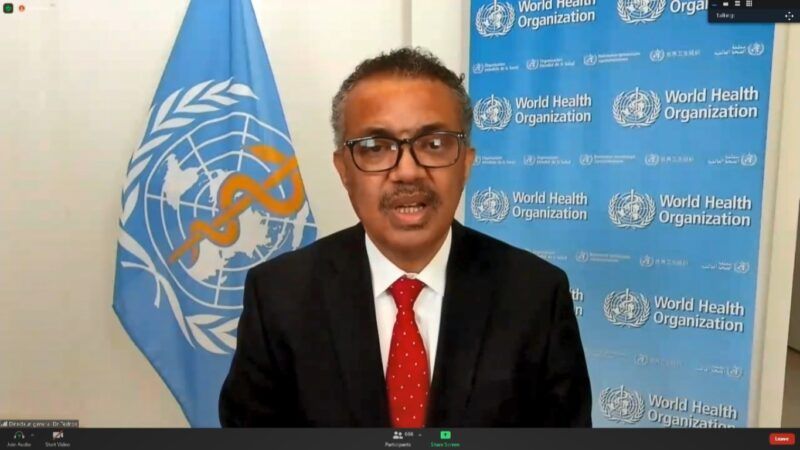WHO Chief Questions His Own Agency's Report on the Origins of COVID-19
"I do not believe that this assessment was extensive enough."

The World Health Organization (WHO) released its global study of the origins of the COVID-19 virus today. The report was put together by a team of disease specialists consisting of 17 international members and 17 members selected by the Chinese government. The WHO investigators were finally allowed into China more than a year after an outbreak of anomalous cases of pneumonia was first identified in Wuhan.
The new report delves into four different scenarios for the origins of the COVID-19 coronavirus. One, that the virus jumped directly from an animal source into humans; two, that the virus incubated in an intermediate animal source and then spread to humans; three, that the virus somehow lurked in frozen foods possibly shipped from outside China; and four, that introduction occurred through a laboratory accident. The investigators suggest that the direct jump scenario is possible-to-likely; the intermediate host spread is very likely; frozen foods as a source is possible; and a lab leak is deemed as an extremely unlikely pathway.
WHO Director-General Tedros Adhanom Ghebreyesus evidently thinks that the conclusion that a lab leak is extremely unlikely has been too hastily made in the report. In his remarks after the report was released, Tedros observed, "Although the team has concluded that a laboratory leak is the least likely hypothesis, this requires further investigation, potentially with additional missions involving specialist experts, which I am ready to deploy."
"I do not believe that this assessment was extensive enough. Further data and studies will be needed to reach more robust conclusions," he added. "Let me say clearly that as far as WHO is concerned all hypotheses remain on the table."
This is a considerable shift from the more obsequious tone the international health agency took at the beginning of the pandemic back in January 2020. "The WHO delegation highly appreciated the actions China has implemented in response to the outbreak, its speed in identifying the virus and openness to sharing information with WHO and other countries," declared a January 28, 2020, press release.
Both the Trump and now the Biden administrations have called out the Chinese government for stymying efforts by outside investigators to trace the origins of the COVID-19 virus.
In an effort create a faster and more transparent international system for identifying and monitoring future disease outbreaks, the leaders of more than 20 countries issued a call today for a new international treaty for pandemic preparedness and response. Such a new treaty would aim at helping governments to "be better prepared to predict, prevent, detect, assess and effectively respond to pandemics in a highly coordinated fashion." This would include enhanced cooperation on establishing outbreak alert systems and faster and more transparent data-sharing.
Although the United States and China did not sign onto the statement calling for a new pandemic treaty, Tedros noted in his press conference that "the comment from member states including the U.S. and China was actually positive."
As the origin country of the 2002 SARS and 2019 COVID coronavirus outbreaks, China clearly owes the rest of the world total data transparency rather than meticulously stage-managed show investigations. The apparently more aggressive challenge to China's obfuscations by the WHO's Tedros is an overdue, but welcome, development.

Show Comments (43)